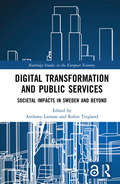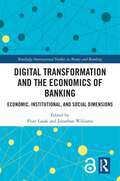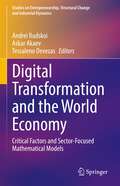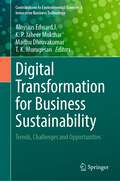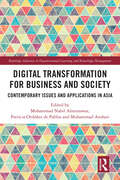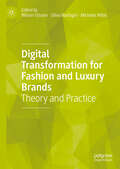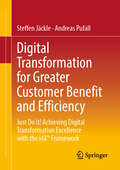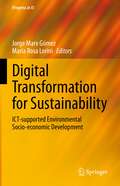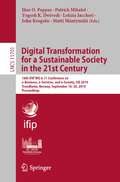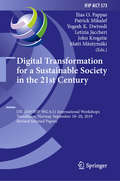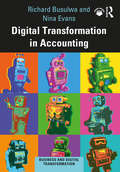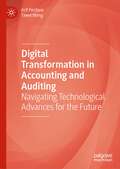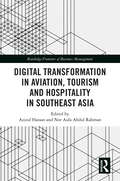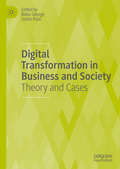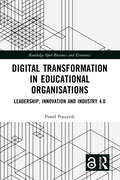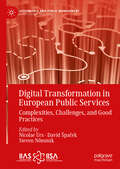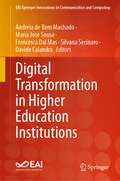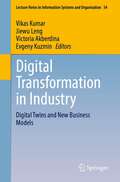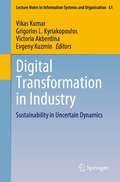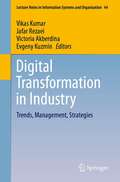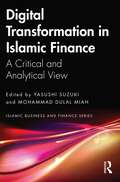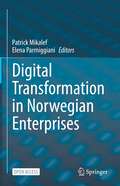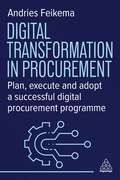- Table View
- List View
Digital Transformation and Public Services: Societal Impacts in Sweden and Beyond (Routledge Studies in the European Economy)
by Robin Teigland Anthony LarssonThrough a series of studies, the overarching aim of this book is to investigate if and how the digitalization/digital transformation process affects various welfare services provided by the public sector, and the ensuing implications thereof. Ultimately, this book seeks to understand if it is conceivable for digital advancement to result in the creation of private/non-governmental alternatives to welfare services, possibly in a manner that transcends national boundaries. This study also investigates the possible ramifications of technological development for the public sector and the Western welfare society at large. This book takes its point of departure from the 2016 Organization for Economic Co-operation and Development (OECD) report that targets specific public service areas in which government needs to adopt new strategies not to fall behind. Specifically, this report emphasizes the focus on digitalization of health care/social care, education, and protection services, including the use of assistive technologies referred to as "digital welfare." Hence, this book explores the factors potentially leading to whether state actors could be overrun by other non-governmental actors, disrupting the current status quo of welfare services. The book seeks to provide an innovative, enriching, and controversial take on society at large and how various aspects of the public sector can be, and are, affected by the ongoing digitalization process in a way that is not covered by extant literature on the market. This book takes its point of departure in Sweden given the fact that Sweden is one of the most digitalized countries in Europe, according to the Digital Economy and Society Index (DESI), making it a pertinent research case. However, as digitalization transcends national borders, large parts of the subject matter take on an international angle. This includes cases from several other countries around Europe as well as the United States.
Digital Transformation and the Economics of Banking: Economic, Institutional, and Social Dimensions (Routledge International Studies in Money and Banking)
by Jonathan Williams Piotr ŁasakThe book provides deep insight into the processes of digital transformation of banking according to economic, institutional, and social dimensions. Together with the transformation of incumbent banks, the processes result in changes in the scope of existing banking services. Moreover, new entities (FinTech firms) partner with incumbent banks and reshape the banking sector and its financial environment. The far-reaching transformation of banks and the banking sectors is accompanied by some institutional and socioeconomic processes. Regarding institutional processes, the book provides insight into the digitalization of the banking sector from a legal point of view. Traditionally, banking is strongly regulated by norms and rules and this status should be maintained when new entities are entering the sector and/or when new technological solutions contribute to the provision of banking services. Regarding socioeconomic processes, it must be highlighted that digitalization is exerting a powerful impact on societies. One significant example, among others, is the increase in the financial inclusion of disadvantaged groups (especially customers either underserved by the traditional financial sector or unbanked). The socioeconomic aspect, however, has a much greater dimension and its selected aspects are described in this book. The principal audience of the book will be scholars in the fields of banking and finance, but also other related disciplines in the social sciences that are of particular relevance to the banking sector’s digital transformation. This includes legal science, management, and psychology. The book also targets professionals in the financial industry interested in the impact of new financial technologies on banking sectors and bank services, particularly with a main focus on legal and socioeconomic dimensions.
Digital Transformation and the World Economy: Critical Factors and Sector-Focused Mathematical Models (Studies on Entrepreneurship, Structural Change and Industrial Dynamics)
by Tessaleno Devezas Andrei Rudskoi Askar AkaevNanotechnology, biotechnology, information technology, and cognitive sciences are contributing to the emergence of intelligent computers and robots with elements of artificial intelligence and intelligent machines. This book postulates that these developments are accelerating the technological substitution of jobs and the shift in labor demand towards high qualification levels, putting the jobs of lower-skilled labor at risk. The digital economy is poised to increase the demand for highly qualified specialists in STEM fields (scientific research, innovative technologies, engineering, and mathematics serving digital technologies). In addition, highly skilled robotics engineers, AI and machine learning specialists, and virtual and augmented reality architects will be required. This book, using sector-focused mathematical models, explores how the demand for specialized human capital will play a decisive role in increasing the efficiency and productivity of labor in the digital economy. Success is guaranteed to those entrepreneurs who manage to establish a successful process of interaction with intelligent machines, which will require a deep restructuring of the training system for the digital economy.
Digital Transformation at Brazilian Retailer Magazine Luiza
by Thales S. Teixeira Leandro Guissoni Tania Modesto Veludo-de-OliveiBy late 2017, Brazilian retailer Magazine Luiza's CEO was convinced that the company could significantly grow sales and accomplish its aspirations of digital transformation. What was unclear in his mind was whether he should act as a tech company and grow as fast as possible (e.g., high double digits) or be more conservative and grow sales at a financially healthy rate, like traditional retailers did (e.g., single digits). The primary way e-retailing companies achieved these abnormally high rates of growth was through lowering prices and foregoing profitability. Historically, mass retailing had razor-thin margins. It was thus unlikely that he could have it both ways: grow fast and be profitable. Should Trajano opt for more aggressive growth or proceed more conservatively?
Digital Transformation at Brazilian Retailer Magazine Luiza
by Thales S. Teixeira Leandro Guissoni Tania Modesto Veludo-de-OliveiBy late 2017, Brazilian retailer Magazine Luiza's CEO was convinced that the company could significantly grow sales and accomplish its aspirations of digital transformation. What was unclear in his mind was whether he should act as a tech company and grow as fast as possible (e.g., high double digits) or be more conservative and grow sales at a financially healthy rate, like traditional retailers did (e.g., single digits). The primary way e-retailing companies achieved these abnormally high rates of growth was through lowering prices and foregoing profitability. Historically, mass retailing had razor-thin margins. It was thus unlikely that he could have it both ways: grow fast and be profitable. Should Trajano opt for more aggressive growth or proceed more conservatively?
Digital Transformation for Business Sustainability: Trends, Challenges and Opportunities (Contributions to Environmental Sciences & Innovative Business Technology)
by K. P. Jaheer Mukthar Aloysius Edward J. Madhu Dhruvakumar T. K. MurugesanThis book explores how digital technologies can be used to drive sustainable business practices and achieve long-term business success. It offers insights and practical strategies and guidance that can help businesses adapt to the digital age, optimize their operations, and create new opportunities for growth. The book further provides real-world examples that illustrate how businesses can leverage digital technologies to achieve long-term sustainability and success. The book is an essential read for business leaders, managers, academician, practitioners and entrepreneurs who are looking to drive sustainable digital transformation within their organizations. The book covers a wide range of topics, including:1) Understanding the digital landscape: The book provides an overview of the digital technologies that are transforming business operations, such as artificial intelligence, cloud computing, and the Internet of Things. It explores how these technologies can be leveraged to create sustainable business practices that benefit both the organization and society.2) Building a digital strategy for sustainability: The book offers guidance on how businesses can develop a digital strategy that aligns with their sustainability goals. It covers topics such as identifying digital opportunities, setting targets, and measuring performance.3) Embedding sustainability into digital operations: The book explores how businesses can integrate sustainability into their digital operations, such as data management, supply chain management, and product design. It provides examples of companies that have successfully implemented sustainable digital practices.4) Digital innovation for sustainability: The book discusses how businesses can use digital innovation to create new opportunities for sustainability. It covers topics such as circular economy business models, sustainable product design, and social innovation.5) Leading for sustainable digital transformation: The book offers insights on how business leaders can drive sustainable digital transformation within their organizations. It covers topics such as leadership skills, organizational culture, and stakeholder engagement.
Digital Transformation for Business and Society: Contemporary Issues and Applications in Asia (Routledge Advances in Organizational Learning and Knowledge Management)
by Mohammad Nabil Almunawar, Patricia Ordóñez de Pablos and Muhammad AnshariThe advancement of technology, such as data analytics and AI, has led to the birth of Industry 4.0, in which technology seems to be at the centre of development. However, as the COVID-19 pandemic created havoc, the entire world production chain was seriously affected, highlighting that machines alone, although fully connected and automated, cannot function without people. This book addresses contemporary issues and the impact of digital transformation on individuals, businesses and governments in Asia. As Asian nations are moving fast towards the digital economy, this edited collection offers new perspectives on understanding emerging business opportunities as well as the challenges faced. Chapters explore the variables that accelerate digital transformation, notably the COVID-19 pandemic, the rapid development of information and communication technology, AI, big data and affordable internet access, and their impact on business and society. With rich, empirical studies from leading researchers, this book will be a reference for academics and scholars across business disciplines, including information, technology and innovation management, organisational and strategic management, as well as those interested in industrial development.
Digital Transformation for Fashion and Luxury Brands: Theory and Practice
by Wilson Ozuem Silvia Ranfagni Michelle WillisThis book re-evaluates the diffusion and positioning of fashion and luxury brands following the impact and disruption of digital transformations, particularly on existing omni-channel models and touchpoints and consumer behaviours. By exploring the importance of digital transformation and discussing the benefits and challenges it has created for the fashion industry, this book provides insights into the role of various digital technologies, systems and strategies in generating and maintaining brand value and equity, customer engagement and experiences and connecting the marketplace and marketspace. Chapter 16 is available open access under a Creative Commons Attribution 4.0 International License via Springer Link.
Digital Transformation for Greater Customer Benefit and Efficiency: Just Do It! Achieving Digital Transformation Excellence with the i4X® Framework
by Steffen Jäckle Andreas PufallDigital transformation is not an end in itself. The focus of this process must always be on enhancing customer benefits and improving the efficiency of service provision. Only in this way can digital transformation be meaningful and successful for companies. The authors of this book demonstrate how transformation excellence can be achieved using the i4X® framework: In four steps—Insight, Ignite, Innovate, and Implement—the systematic execution of digital transformation initiatives takes place. The i4X® framework has emerged from entrepreneurial practice and is scientifically grounded. Numerous examples and illustrations facilitate its application in companies, in line with the authors' motto: Just do it!
Digital Transformation for Sustainability: ICT-supported Environmental Socio-economic Development (Progress in IS)
by Jorge Marx Gómez Maria Rosa LoriniThis book presents case studies to analyse the relationship between sustainability – environmental, social, institutional and economic – and digital innovation. The respective contributions offer a contextualisation of the main present and future trends concerning these two elements, and present analyses from economic, technical, managerial, and social perspectives alike. The individual sections of the book focus on interactions between sustainability and digital innovation in existing organisations and highlight the new opportunities, challenges and threats that may emerge as a result. The contributions are mainly based on case studies and research conducted in Europe and Africa, with a few focusing on Southeast Asia and Central America, and were prepared by experts in the fields of Information Systems, Computer Science, Social Development, and Economics.
Digital Transformation for a Sustainable Society in the 21st Century: 18th IFIP WG 6.11 Conference on e-Business, e-Services, and e-Society, I3E 2019, Trondheim, Norway, September 18–20, 2019, Proceedings (Lecture Notes in Computer Science #11701)
by Yogesh K. Dwivedi John Krogstie Matti Mäntymäki Letizia Jaccheri Ilias O. Pappas Patrick MikalefThis book constitutes the proceedings of the 18th IFIP WG 6.11 Conference on e-Business, e-Services, and e-Society, I3E 2019, held in Trondheim, Norway, in September 2019. The total of 61 full and 4 short papers presented in this volume were carefully reviewed and selected from 138 submissions. The papers were organized in topical sections named: e-business; big data analytics, open science and open data; artificial intelligence and internet of things; smart cities and smart homes, social media and analytics; digital governance; digital divide and social inclusion; learning and education; security in digital environments; modelling and managing the digital enterprise; digital innovation and business transformation; and online communities.
Digital Transformation for a Sustainable Society in the 21st Century: I3E 2019 IFIP WG 6.11 International Workshops, Trondheim, Norway, September 18–20, 2019, Revised Selected Papers (IFIP Advances in Information and Communication Technology #573)
by Yogesh K. Dwivedi John Krogstie Matti Mäntymäki Letizia Jaccheri Ilias O. Pappas Patrick MikalefThis book constitutes papers from the workshops held at the 18th IFIP WG 6.11 Conference on e-Business, e-Services, and e-Society, I3E 2019, which took place in Trondheim, Norway, in September 2019. The 11 full papers and 4 short papers presented in this volume were carefully reviewed and selected from 33 submissions to the following workshops:DTIS: Digital Transformation for an Inclusive SocietyTPSIE: Trust and Privacy Aspects of Smart Information Environments3(IT): Innovative Teaching of Introductory Topics in Information TechnologyCROPS: CROwd-Powered e-Services
Digital Transformation in Accounting (Business and Digital Transformation)
by Richard Busulwa Nina EvansDigital Transformation in Accounting is a critical guidebook for accountancy and digital business students and practitioners to navigate the effects of digital technology advancements, digital disruption, and digital transformation on the accounting profession. Drawing on the latest research, this book: Unpacks dozens of digital technology advancements, explaining what they are and how they could be used to improve accounting practice. Discusses the impact of digital disruption and digital transformation on different accounting functions, roles, and activities. Integrates traditional accounting information systems concepts and contemporary digital business and digital transformation concepts. Includes a rich array of real-world case studies, simulated problems, quizzes, group and individual exercises, as well as supplementary electronic resources. Provides a framework and a set of tools to prepare the future accounting workforce for the era of digital disruption. This book is an invaluable resource for students on accounting, accounting information systems, and digital business courses, as well as for accountants, accounting educators, and accreditation / advocacy bodies.
Digital Transformation in Accounting and Auditing: Navigating Technological Advances for the Future
by Arif Perdana Tawei WangThis book elucidates the digital transformation of accounting by examining the countless challenges academic institutions encounter in the wake of technological progress. This underscores the importance of accountants in enhancing their skill set to align with today’s evolving digital landscape. The text evaluates cutting-edge technologies, such as artificial intelligence, data analytics, and blockchain, exploring their impact on accounting decision-making processes. Through a comprehensive analysis of the intersection between these technologies and diverse industrial sectors, this book illuminates the distinctive challenges and possibilities. The book provides an essential reference for professionals and scholars seeking a thorough understanding of accounting domain in the digital age.
Digital Transformation in Aviation, Tourism and Hospitality in Southeast Asia (Routledge Frontiers of Business Management)
by Azizul Hassan and Nor Aida Abdul RahmanTechnological advances and the drive to digitalize business processes in aviation, tourism, and hospitality have forced the industries to go along with the digital movement. The results are often mixed. This book brings together contributions from leading scholars in the field and explores the digital transformation in these industries in Southeast Asia. The book looks at the impact of digital transformation on the region and the issues and challenges brought about by this transformation. It also addresses trends in the industries from blockchain technology, AI, biometric and mobile technology applications to in-flight catering. It examines the impact of COVID-19 on the industries and how the pandemic has led to businesses adopting new business models. Through the case studies of digital adoptions in the region, readers will gain insights on how the countries have leveraged new technologies and the implementation processes to drive digital transformation. The book aims to help scholars and policy makers understand the digital advances in the industries to better formulate responses in research and policy making and deliver effective digital transformation.
Digital Transformation in Business and Society: Theory and Cases
by Justin Paul Babu GeorgeThe digital traces that people leave behind as they conduct their daily lives provide a powerful resource for businesses to better understand the dynamics of an otherwise chaotic society. Digital technologies have become omnipresent in our lives and we still do not fully know how to make the best use of the data these technologies could harness. Businesses leveraging big data appropriately could definitely gain a sustainable competitive advantage. With a balanced mix of texts and cases, this book discusses a variety of digital technologies and how they transform people and organizations. It offers a debate on the societal consequences of the yet unfolding technological revolution and proposes alternatives for harnessing disruptive technologies for the greater benefit of all. This book will have wide appeal to academics in technology management, strategy, marketing, and human resource management.
Digital Transformation in Educational Organizations: Leadership, Innovation and Industry 4.0 (Routledge Open Business and Economics)
by Paweł PoszytekTechnological transformation should lead to enhance people’s potential and the development of their cognitive and social competences, especially those connected with effective communication on different levels. The COVID-19 pandemic has intensified all these processes and, for better resilience and effectiveness at work, it requires now different sets of competences. This book gives direct insight into changes that take place in education in the context of an unprecedented and rapid technological advancement, which requires the reorientation of goals and functions based on innovative, adaptive and flexible solutions – in most cases driven by individual leadership. It describes the way to reach this reorientation and shows through thorough research how educational leaders position themselves on this way in this fast-changing ecosystem. Exploring how educational leaders manage the challenges of digital transformation, using European collaborative projects, this research volume discusses how this process impacts the effectiveness and sustainability of organizational activities. Establishing a model for assessing digital transformation in educational organizations and evaluating the effectiveness of their leaders, it will be of value to researchers, academics, practitioners, and advanced students in the fields of leadership, organizational change, management of technology and innovation, and those interested in the development of education and the utilization of digitalization.
Digital Transformation in European Public Services: Complexities, Challenges, and Good Practices (Governance and Public Management)
by David Špaček Nicolae Urs Steven NõmmikThis book examines digital transformation in the public sector. Drawing on case studies from around Europe, it identifies management practices that facilitate or hinder the implementation of digital transformation in various contexts and at different levels of government. Chapters consider how digital technologies are being used to improve public service delivery, how public institutions are employing AI, and the potential benefits for organizations and citizens. They also assess the obstacles to digital transformation, including budget constraints, legislation, and insufficient expertise. Providing nuanced insights from real-world projects that have sought to usher public sector institutions into the digital age, the book highlights what has worked well, what has not worked, and why. In doing so, it offers lessons for future projects and acts as a comprehensive guide offering actionable insights for academics and practitioners. It will appeal to all those interested in public administration, public management, and digital transformation.
Digital Transformation in Higher Education Institutions (EAI/Springer Innovations in Communication and Computing)
by Silvana Secinaro Maria José Sousa Andreia de Bem Machado Francesca Dal Mas Davide CalandraThis book analyzes digital technologies being used in the teaching-learning process. The authors show how the use of AI in higher education can provide personalized education through the automation of administrative teaching tasks, software programs that favor the detection of topics that need reinforcement in the classroom, the guidance and support of students outside the classroom, and the use of data intelligently to teach and support students. In addition, the authors show how to further personalize education with the use of augmented reality, adaptive platforms, intelligent tutor systems, Chatbots, adaptive learning, computer aided instruction, MOOCs, and robotics. The authors answer questions such as: What sustainable educational technologies can be used in the teaching-learning process; How can Blockchain technology and AI be applied in higher education; How can the metaverse be applied in virtual learning environments? The book is relevant to researchers, professionals, andstudents interested in technology and education.
Digital Transformation in Industry: Digital Twins and New Business Models (Lecture Notes in Information Systems and Organisation #54)
by Vikas Kumar Victoria Akberdina Evgeny Kuzmin Jiewu LengThis book offers a selection of the best papers presented at the annual international scientific conference “Digital Transformation in Industry: Trends, Management, Strategies (DTI2021),” held by the Institute of Economics, Ural Branch of the Russian Academy of Sciences, in Ekaterinburg (Russia) on October 29, 2021. The book focuses on the idea of introduction mechanisms for digitization processes and on highlighting successful digital transformation strategies in all sectors of industry. Key topics include the development of a cyber-physical production system for Industry 4.0; digital design technologies for enhancing the competitiveness of products and companies; digital twin-driven product manufacturing and services; and the effects of the industrial digital transformation on society and the environment. With regard to implementing IT and other technological innovations, lessons learned in developed and developing economies, as well as small and large enterprises, are included. Given its scope, the book offers a valuable asset for researchers and managers of industrial organizations alike.
Digital Transformation in Industry: Sustainability in Uncertain Dynamics (Lecture Notes in Information Systems and Organisation #61)
by Vikas Kumar Grigorios L. Kyriakopoulos Victoria Akberdina Evgeny KuzminThis book offers a selection of the best papers presented at the annual international scientific conference “Digital Transformation in Industry: Trends, Management, Strategies,” which was held by the Institute of Economics of the Ural Branch of the Russian Academy of Sciences (Ekaterinburg, Russia) on October 28, 2022.The book focuses on concepts for initiating digitalization processes and identifying successful digital transformation strategies in all sectors of industry. Key topics include the sustainability of digital transformation in uncertain dynamics; conditions of uncertainty and barriers; industrial logistics in the new reality; best practices for implementing digital solutions to ensure sustainable, barrier-free and flexible supply chains; the achievement of sustainability in the process of digital transition; the adaptation of enterprises to the ESG concept through digital solutions; assessing the impact of industrial digital transformation on society and the environment; and clarifying how ESG aspects affect the economy. The experiences of various countries, regions and types of enterprise implementing IT and other technological innovations are also included, making the book a valuable asset for researchers and managers alike.
Digital Transformation in Industry: Trends, Management, Strategies (Lecture Notes in Information Systems and Organisation #44)
by Vikas Kumar Jafar Rezaei Victoria Akberdina Evgeny KuzminThis book offers a selection of the best papers presented at the international scientific conference "Digital Transformation in Industry: Trends, Management, Strategies", held by the Institute of Economics of the Ural Branch of the Russian Academy of Sciences, Russia in November 2020. The main focus of the book is to evaluate trends and perspectives of digital transformation in industry and industrial markets through the dissemination of Industry 4.0. The aim of the topics discussed is to create an idea of introduction mechanisms for digitization processes and to specify successful strategies of digital transformation in all sectors of industrial enterprises. The experience of developed and developing economies, as well as small and large enterprises implementing IT and other technological innovations are included. Students as well as managers of industrial organizations alike can benefit from the results of the topics covered.
Digital Transformation in Islamic Finance: A Critical and Analytical View (Islamic Business and Finance Series)
by Yasushi Suzuki Mohammad Dulal MiahThe ongoing digital transformation is shaping the Islamic mode of financial intermediation and the impact on the faith-based financial mode has been multifaceted. This has raised a host of interesting questions: what is the degree of penetration of Islamic finance in the fintech industry? Are Islamic financial institutions (IFIs) or banks ready to embrace fintech? Is fintech an enabler or barrier to achieve the intended purpose of Islamic finance? Will technology narrow the division between Islamic and conventional finance in the future? These are existential questions for Islamic finance and the book endeavors to examine the impact of financial technology on the industry. The book assesses various fintech business models and how they could be a threat or an opportunity. It also examines whether fintech provides IFIs an edge to serve clients following the Shariah norms and how the adoption of fintech in the Islamic mode is required for meeting the maqasid Al Shariah. The book discusses applicability of fintech like blockchain, digital currency, big data, and AI to different branches of Islamic finance. This book will interest students, analysts, policymakers, and regulators who are working on Islamic finance, financial economics, Islamic economics, and development finance.
Digital Transformation in Norwegian Enterprises
by Patrick Mikalef Elena ParmiggianiThis open access book presents a number of case studies on digital transformation in Norway, one of the fore-runners in the digital progress index established by the European Commission in 2020. They explore the process of adoption, diffusion and value generation from digital technologies, and how the use of different digital solutions has enabled Norwegian enterprises to digitally transform their operations and business models.The book starts with an introductory chapter summarizing a vast body of literature in order to synthesize what is already known about digital transformation before exploring the Norwegian context in more detail. Then a series of case studies from the private and public sector in Norway is presented. They document a process perspective which describes the sequence of events during and after adoption of digital solutions, as well as the types of business value that were realized. Through these single studies, the process of digital transformation is illustrated, a number of key findings highlighted, and eventually theoretical and practical recommendations based on these cases emphasized. The book closes with a brief overview of some emerging technologies, and comments on how they are likely to change different sectors. Digital transformation has been one of the priority areas for the Norwegian government over the past years and puts Norwegian enterprises upfront in adopting novel technologies and utilizing them for achieving organizational goals. This experience accumulated over the years makes the Norwegian context a particularly interesting one in understanding how private and public organizations make use of new digital solutions, what lessons can be learnt during the process, and what are some of the key success and failure factors. This way the book is written for practitioners who are currently involved in digital transformation projects in their organizations, researchers of information systems and management, as well as master students in degrees of informatics and technology management.
Digital Transformation in Procurement: Plan, Execute and Adopt a Successful Digital Procurement Programme
by Andries FeikemaWith digitalization a consistent theme on every procurement leader's agenda, this book provides a practical approach, empowering leaders to skilfully navigate the intricacies of digital transformation in procurement. Many procurement leaders struggle to deliver their digitalization agendas due to slow, costly and underwhelming results. Digital Transformation in Procurement is designed to help procurement leaders embrace digital transformation and drive top-line growth. Covering the essential success factors, the impact of digitalization on people, organization processes and technology, this book helps leaders in procurement make any digitalization transformation a success and deliver value at scale. Digital Transformation in Procurement is a practical resource offering valuable insights, frameworks and examples from global procurement transformation programmes. Taking a holistic approach to digital transformation, this book covers key challenges, new technologies and how procurement leaders can make digitization work for them. This is the book every procurement leader needs to launch their new procurement strategy for the digital age.
